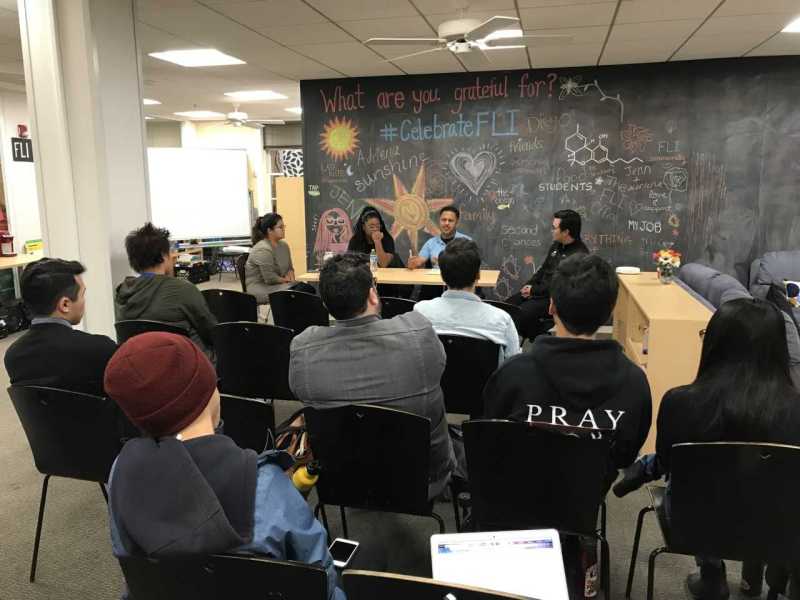A small group of students gathered to attend a conversation on affordable housing with two East Palo Alto-based (EPA) community organizers, First-Generation Low Income Partnership’s (FLIP) first major speaker event of the year.
Tameeka Bennett, executive director of Youth United for Community Action (YUCA), and Stewart Hyland, a community organizer for Faith in Action (FIA), discussed their organization’s work supporting local ballot initiatives for the midterm elections, including Measure HH and Proposition 10.
Measure HH, or the “tech tax,” is a parcel tax that targets the owners of large commercial office spaces. Revenue from the tax would go to affordable housing and job training for underprivileged people interested in working in tech. Measure HH was voted into law last Tuesday and is estimated to raise $1.67 million.
“We’re just taxing the heck out of tech companies in our communities,” Bennett said of Measure HH, on which both she and Hyland worked closely. “They seriously displace our families and they will tell you day in and day out, ‘Oh, it’s not our fault.’ They may not be the direct cause, but they are definitely one of the biggest indirect causes of displacement and gentrification in our community.”
Proposition 10 was one of 11 California-specific propositions that appeared on last week’s ballot. The attempt to expand local rent control was a particularly divisive issue that drew widespread support from Democrats and opposition from Republicans. The proposition was voted down last week by 61 percent of voters, according to the San Francisco Chronicle.
Gentrification and the need for housing justice are relatively new phenomena for EPA.
“The time I came here, in the late 80s, everyone really kinda got along and kinda knew what was what,” Hyland said. “If you wanted to get the best red snapper you … go for the fish place. If you wanted taquitos, you would go to the taqueria.”
But Facebook’s recent announcement of its plans for a new campus in EPA caused housing prices in the area to skyrocket, reaching a median of $1 million last month.
“We’re in an interesting place now where we’ve had to start defining East Palo Alto in a different way,” Bennett said of big tech’s impact on the area. “Not so much spatially … We’ve had to start redefining EPA as in the people who make up the community, who’ve been there since the beginning, have lived there for the better part of their lives and [who are] being pushed out of communities.”
In response, community advocates such as Hyland and Bennett have worked on establishing long-term relationships with city council.
“A key method we use in our organizing is … building relationships,” Hyland said. “We can’t necessarily endorse a candidate because we’re 501(c)(3)s, but we can push policy and so we’ve established a track record of [where] we will get voters to the polls for things that we think are important.”
Hyland and Bennett view the enactment of Measure HH and current East Palo Alto Mayor Ruben Abrica’s acknowledgement of the housing crisis as proof of their success. However, they are far from done.
“Coming up in 2020, we’re looking at repealing part of Prop 13 which limits taxes for corporations,” Hyland said. “We’re probably going to come back with another version of Prop 10 – maybe more prescriptive of what rent control should look like.”
Ultimately, Bennett and Hyland don’t want newly arrived outsiders to completely alter the tight-knit community of EPA.
“If you’re going to be in this community, you need to wait a good 10 years before you even think about running for anybody’s council,” Bennett said, referencing the likely slate of newcomers on 2020 ballots. “East Palo Alto has such a rich and diverse history … For a white, privileged, man or woman to come in and run for council after being there for five years, we’re like ‘What the hell are you?’”
Hyland echoed Bennett’s sentiments.
“If you’re not comfortable with gentrifiers, you can call them colonizers,” he said. “It’s about changing culture; it’s not about moving into a place.”
Contact Zora Ilunga-Reed at zora814 ‘at’ stanford.edu and Erin Woo at erinkwoo ‘at’ stanford.edu.
